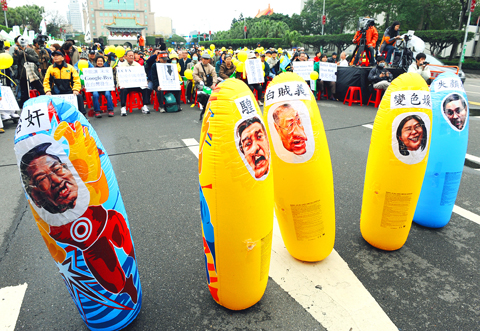|
Group holds discussion on economic pact
By Rich Chang
STAFF REPORTER
Sunday, Jan 24, 2010, Page 3

Inflatable punching bags with caricatures of government officials pinned to them
stand on Ketagalan Boulevard as the Northern Taiwan Society and other
pro-independence groups discussed the government’s proposed economic policies in
Taipei yesterday.
PHOTO: LO PEI-DER, TAIPEI TIMES
A pro-independence group and several economists yesterday
criticized the government’s proposed economic cooperation framework agreement (ECFA)
with China, saying it would seriously harm the country.
The Northern Taiwan Society (台灣北社) yesterday held a public discussion at
Ketagalan Boulevard, inviting economists to discuss the issue.
Taiwan Thinktank chairman Chen Po-chih (陳博志) told those gathered that the
government had not elaborated on exactly what the ECFA is. However, “it is quite
simple, it is a free-trade agreement [FTA] with China,” he said.
Under such a proposal, Chen said, 90 percent of Taiwan’s exports to China would
enjoy tariff-free status, while 90 percent of China’s exports to Taiwan would
enjoy the same treatment, but the latter would seriously harm Taiwan’s
industries and agriculture.
Chen said Premier Wu Den-yih (吳敦義) and Straits Exchange Foundation (SEF)
Chairman Chiang Pin-kung (江丙坤) had both said that Taiwan would save NT$300
billion (US$10 billion) annually in export tariffs to China under an ECFA, but
the Ministry of Finance had put the figure at NT$104.7 billion.
Accusing Wu and Chiang of lying, Chen said NT$104.7 billion was not a large
amount.
The ECFA would only benefit big business, he said, adding that small and
medium-sized enterprises, laborers and farmers would suffer.
Taiwan’s big businesses would end up under Beijing’s control, he said.
Wang To-fa (王塗發), an economics professor at National Taipei University, said an
ECFA with Beijing would pave the way for a “one China” market and eventual
unification.
Great numbers of sub-standard Chinese products, counterfeit technology and
agricultural products would enter the country, while around 1 million Taiwanese
would lose their jobs, Wang said.
He listed four shortcomings under the ECFA: Taiwanese real wages would fall,
technology and people with technical skills would flow to China, Taiwanese
capital flows to China would increase and Taiwan would be localized as part of
China.
Citing Mainland Affairs Council (MAC) Chairwoman Lai Shin-yuan’s (賴幸媛) remark
on Friday that she believed Beijing would not obstruct Taiwan from signing FTAs
with other countries, Wang said Lai had lied to the public because Chinese
officials clearly stated in April that they would not allow Taiwan to sign FTAs
with other countries.
|
![]()
![]()
![]()